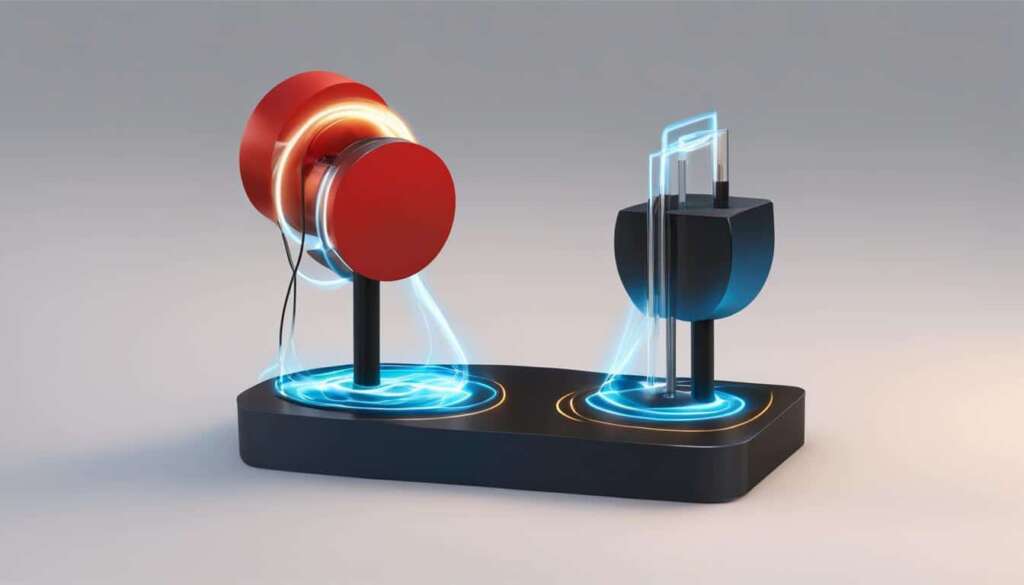Table of Contents
Electric charge is a fundamental concept in physics, which has been studied for centuries. It is an essential property of matter, and plays a crucial role in our daily lives. In this section, we will explore the basic principles of electric charge, its properties, and its role in physics.
Electric charge is the physical property of matter that causes it to experience a force when placed in an electromagnetic field. It is measured in coulombs (C) and can be either positive or negative. Like charges repel each other, while opposite charges attract each other.
The concept of electric charge is important in many fields of science, including electromagnetism, electronics, and electrochemistry. Understanding electric charge is crucial in these fields, and it forms the basis for the design and development of many devices that we use every day, such as smartphones, televisions, and computers.
Key Takeaways
- Electric charge is a fundamental concept in physics.
- Electric charge is the physical property of matter that causes it to experience a force when placed in an electromagnetic field.
- Electric charge can be either positive or negative, and like charges repel each other while opposite charges attract each other.
- Understanding electric charge is crucial in the fields of electromagnetism, electronics, and electrochemistry.
- Many devices that we use every day, such as smartphones, televisions, and computers, rely on our understanding of electric charge.
Properties of Electric Charge
Electric charge can be defined as an intrinsic property of matter that causes a force to arise between particles. Here, we will explore some properties of electric charge that help us to understand this concept in greater depth.
Positive and Negative Charges
Electric charges are either positive or negative. Opposite charges attract one another, while similar charges repel. This force is known as an electrostatic force. It was first discovered by Charles-Augustin de Coulomb and is determined by the product of the charges and the distance between them.
The Coulomb
The coulomb is the fundamental unit of charge, named after Charles-Augustin de Coulomb. One coulomb corresponds to the total charge of approximately 6.24 x 10^18 electrons. It is important to note that charges exist in discrete units and are always an integer multiple of the charge of a single electron.
Charge Transfer
Electric charge can be transferred between objects or particles through processes such as induction and conduction. Induction occurs when an object with a charge produces a force on another object causing a transfer of charge. Conduction occurs when a charged object comes into contact with a neutral object, allowing a transfer of charge.
“Electrons, protons, and neutrons are the basic subunits of atoms. Electrons carry a negative charge, protons carry a positive charge, while neutrons carry no charge at all.”
Role of Electric Charge in Physics
Electric charge plays a vital role in the field of physics. It is responsible for the interactions between particles that lead to the creation of electric and magnetic fields. These fields, in turn, are the basis for a wide range of fundamental phenomena that govern our world.
Through the principles of attraction and repulsion, electric charge allows us to understand phenomena ranging from the subatomic level to macroscopic objects. Additionally, electric charge is responsible for the generation of electrical currents by interacting with magnetic fields.
The phenomenon of electric charge has led to groundbreaking discoveries, notably the invention of circuits, motors, and generators. As such, it can be concluded that the role of electric charge in physics extends far beyond theoretical concepts and has practical applications that have revolutionised our world.
Conclusion
As we conclude our exploration of electric charge, it is clear that we have gained a deep understanding of its basic principles. By examining its properties and characteristics, we have been able to appreciate the fundamental unit of charge known as the coulomb, and how charges can be transferred through induction and conduction.
In addition, we have explored the significant role that electric charge plays in the field of physics, particularly in its interaction with electric and magnetic fields. Through this, we have gained insights into phenomena such as attraction, repulsion, and the generation of electrical currents.
Overall, our journey has been a fascinating one, and we hope that this exploration has provided you with a better understanding of the importance of electric charge in the world around us.
FAQ
What is electric charge?
Electric charge is a fundamental property of matter. It can be positive or negative, and it is responsible for the electromagnetic force between particles.
How is electric charge measured?
Electric charge is measured in coulombs (C), which is the fundamental unit of charge. One coulomb is equivalent to the charge of approximately 6.24 x 10^18 electrons.
What causes objects to become charged?
Objects become charged when there is an imbalance of electrons or protons. If an object gains electrons, it becomes negatively charged, while losing electrons causes a positive charge.
Can electric charge be transferred between objects?
Yes, electric charge can be transferred between objects through processes like induction and conduction. Induction occurs when a charged object is brought near an uncharged object, causing a redistribution of charges. Conduction happens when two objects come into direct contact, allowing charge transfer.
What is the role of electric charge in physics?
Electric charge plays a crucial role in physics. It interacts with electric and magnetic fields, leading to phenomena such as attraction, repulsion, and the generation of electrical currents. It is also the basis for concepts like voltage, resistance, and capacitance.












